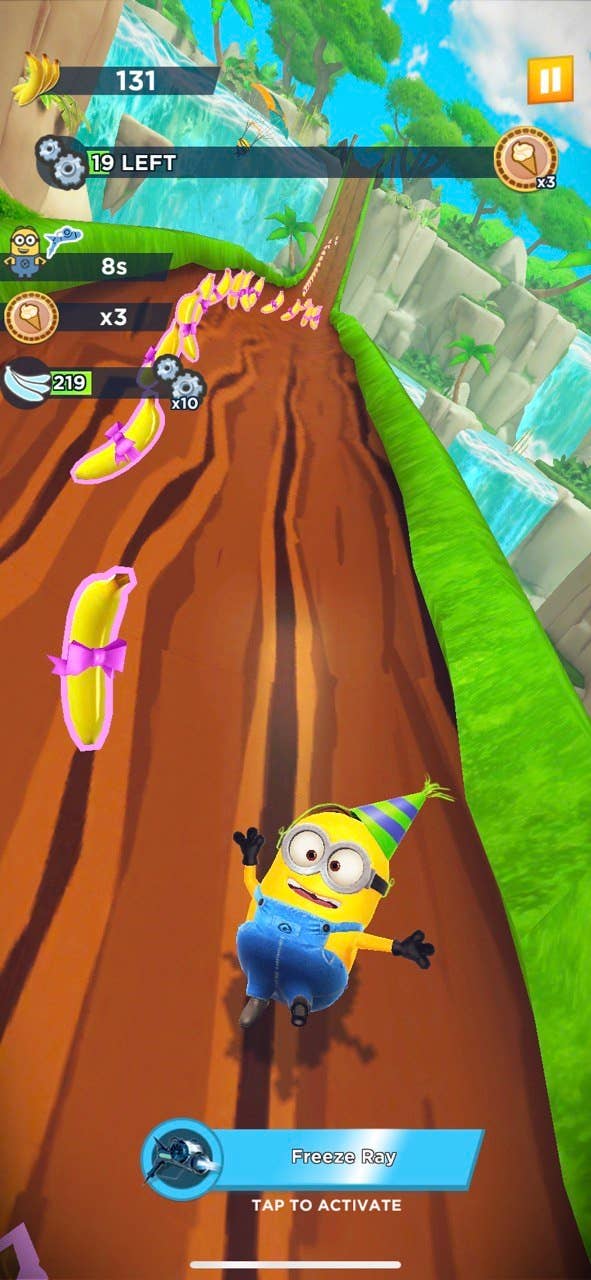Lessons from the 'endless' runner Minion Rush
NBC Universal's Berto Campo and Gameloft Kharkiv's Stanislav Sadkeyev talk about keeping the licensed game going after eight years and a billion downloads
Minion Rush is a rare licensed mobile game in that the endlessly updated not-quite-endless runner has been around for eight years, racked up one billion downloads, and with another Minions movie, The Rise of Gru, set for release next year, it still appears to have some considerable runway of relevance ahead of it.
Speaking with GamesIndustry.biz recently, NBC Universal senior games producer Berto Campo and Gameloft Kharkiv general manager Stanislav Sadkeyev talked about how much the game has changed over the years and what they've learned managing a licensed mobile game this long after launch.
"The game started out very simplistic, very 'Saga' and maps-based," Campo says. "But I think as we've seen the runner genre evolve in different ways where it's not always having to be endless, we started adding mission structures to it, giving players more day-to-day activities to accomplish, achievements, things of that nature. The game has lost the leaderboard mechanic and the endless running mode has definitely been modified throughout the years, but I think we're also going back to basics and are at a period where we really understand what our audience is seeking."

As with many mobile games, that has meant more content, most cosmetic options (costumes in Minion Rush's case), and more seasonal events, such as the recent Celebration Event to mark not only the one billion download milestone, but also the eighth anniversary of the game.
That event launched June 2, and challenged players to collect a total of 33 billion in-game bananas in order to unlock the King Bob costume. In addition to that, the Minions satrs Bob and Stuart were added to the game as new playable characters.
"It's just more of what the players want, and continuously refining that so it's not the same game two to three years in," Campo says. "We also have to understand that we garner a good amount of new players every week and every month, and cycle through those on an annual basis. For us, we're serving new players all the time. Keeping the game fresh for the legacy players, the long-term customers we have, but also making sure the new audience has something to look forward to."
"Thanks to the great success of the brand, there's almost no [paid] user acquisition on this game"
Stanislav Sadkeyev
That regular influx of new players is one area where the Minions license has been particularly helpful.
"Thanks to the great success of the brand, there's almost no [paid] user acquisition on this game," Sadkeyev says. "Almost all the users are organic and come to us naturally. But we're always testing user acquisition a little bit, but not at scale."
While the license has been a boon to the game from day one, Campo believes it's positioned to become even more so given recent changes in the mobile system that could hurt games more reliant on paid user acquisition.
"Lately with a lot of the privacy and ad-tracking being scrutinized and the environment of both Apple and Google changing in terms of how players can be approached, the strength of this brand puts us in a very good position to actually reap some benefits from some of those policy changes happening in the industry right now," Campo notes.
"Your advertising is all the billboards and everything else, the zeitgeist of Minions in general, the catchiness and humor, all the qualities that make Despicable Me and the Minions brand so attractive to not just kids but families. That's a huge driver of the success of the game."

Campo is quick to credit the Minions animation studio Illumination, not just in building the series and its progenitor franchise Despicable Me in the first place, but in being flexible and allowing the game's developers to play with the brand,
"They've given us a lot of freedom to create new stories," Campo says. "They're mini-stories, but they give us so many different characters, locations, and motivations to just continue to infuse the world with fun and wacky things. If this were some other brand or company, I don't know if we'd get that flexibility and freedom to really delve into aspects and areas of the brand folks feel very guarded about. I don't feel like we have that here."
That's not to say the game is entirely dependent on the film series to drive results. Campo says it's "always helpful" to have a summer blockbuster movie boosting interest in the game, but the game needs to work when there's no big cross-marketing tie-in to take advantage of. To last eight years, it still needs to fill a gap for players in their day-to-day lives, and play patterns suggest it's done that much like any other successful mobile game would.
"We absolutely benefit from [Minions movies], but we're not just takers. We also give back and do brand deposits"
Berto Campo
"We've found there's a seasonality to the game," Campo says. "I think a lot of that goes into what platforms people are playing on. We see big spikes around the holiday and I think you can come to the conclusion that folks are at home, they're on vacation, they want something they can sit back and enjoy for 10-20 minutes of time, or using as a second-screen experience as they're watching a film or TV in general."
He adds, "Our consistent strong reviews on every platform we're on are an indicator that we don't necessarily need a movie in theaters for us to have continued success, but again, Illumination have been great partners in giving us the flexibility and freedom to tell our own stories in the game as well, and I think that feeds back into the ecosystem. Yeah, we absolutely benefit from it, but we're not just takers. We also give back and do brand deposits."
To that end, the partnership with Gameloft is just as important for Universal and Campo as the one with Illumination.

"I've worked with other developers first-hand and in a licensor role where we haven't had the ability to plan things out," Campo says. "When we make a commitment, those commitments get a little loose and deadlines start getting missed. What I found with Gameloft as a partner is they're very analytical, very structured, and very responsible when it comes to putting out quality content."
Sadkeyev says one key to that is the constant desire to make the game better.
"Despite our pretty solid age, we feel like a pretty young project," he says. "We always have a lot of plans and our roadmap looks like a roadmap of a pretty young and ambitious project. What I'm really happy about is we always have [things] to do and there is a never-ending story for us of self-improvement in our game.
He adds, "We are always trying to be data-driven in our decisions. We have a lot of projects in Gameloft so we have a lot of data in Minion Rush and across the other projects, so we have a lot to analyze. And we always listen to our audience."
And even though 'Rush' might be the literal name of the game, Campo seems impressed that it's not the main consideration for Gameloft.
"If it's not ready, we've delayed features because they're not ready," he says. "I'd take that ten times out of ten over somebody who says, 'No we have to release it because that's what we said we would do, even if it's a little under-baked or not ready for primetime.'"
While the success of Minion Rush hasn't really altered the way Universal handles licensed mobile partnerships, it has at least proven out their initial approach.
"I think it's confirmed what we've known individually, which is, 'You can have a successful mobile title,'" Campo says. "How many studios start with that goal but never really achieve it, and that unfortunately kills any other ideas or projects down the road? 'So-and-so didn't work so we're not going to invest so greatly in the next three projects.'
"Minion Rush being one of the first out of the gate for mobile for Universal has really given us the confidence to chase and invest in other projects that maybe on paper don't look to be the strongest, but we understand with a great developer behind us and a great publisher, success can be achieved."
And while it might be easy to spend an inordinate amount of time looking back at that success, Campo and Sadkeyev appear to be more focused on the future.
"Considering eight years in, some people would be happy to just keep the treadmill running," Campo says. "For me, the fact we're doing all these new things and doing them for the first time is to me just a testament to the investment from Gameloft, Illumination and Universal. It's just a happy marriage between the three. The sky's the limit, and things are looking really nice for the future."

